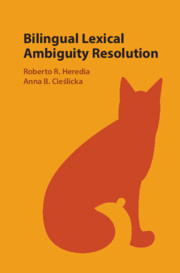Book contents
- Bilingual Lexical Ambiguity Resolution
- Bilingual Lexical Ambiguity Resolution
- Copyright page
- Dedication
- Contents
- Figures
- Tables
- Contributors
- Preface
- Acknowledgments
- Part I Theoretical and Methodological Considerations
- Part II Bilingual Lexical Processing
- 4 Cognate Processing Effects in Bilingual Lexical Access
- 5 Translation Ambiguity
- 6 Lexical Selection and Competition in Bilinguals
- Part III Bilingual Sentence Processing
- Part IV Neuroscience of Bilingual Lexical Access
- Author Index
- Subject Index
- References
6 - Lexical Selection and Competition in Bilinguals
from Part II - Bilingual Lexical Processing
Published online by Cambridge University Press: 24 December 2019
- Bilingual Lexical Ambiguity Resolution
- Bilingual Lexical Ambiguity Resolution
- Copyright page
- Dedication
- Contents
- Figures
- Tables
- Contributors
- Preface
- Acknowledgments
- Part I Theoretical and Methodological Considerations
- Part II Bilingual Lexical Processing
- 4 Cognate Processing Effects in Bilingual Lexical Access
- 5 Translation Ambiguity
- 6 Lexical Selection and Competition in Bilinguals
- Part III Bilingual Sentence Processing
- Part IV Neuroscience of Bilingual Lexical Access
- Author Index
- Subject Index
- References
Summary
This chapter critically reviews the main literature on bilingual lexical selection and competition with an emphasis on speech production and cross-language cognates. We review the most relevant evidence of language coactivation, language competition, and language inhibition, with a focus on evidence from the language- and task-switching paradigm. The chapter also looks at the main factors affecting language control as well as to the extent to which language control is a subsidiary of domain-general executive functions. Finally, we discuss ongoing dialogues on the bilingual advantage debate.
Keywords
- Type
- Chapter
- Information
- Bilingual Lexical Ambiguity Resolution , pp. 126 - 156Publisher: Cambridge University PressPrint publication year: 2020
References
Further Reading
References
- 5
- Cited by

